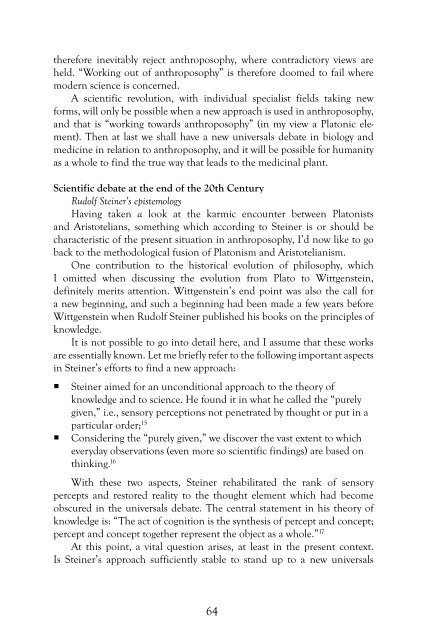When Healing Becomes Educating, Vol. 1 - Waldorf Research Institute
When Healing Becomes Educating, Vol. 1 - Waldorf Research Institute
When Healing Becomes Educating, Vol. 1 - Waldorf Research Institute
You also want an ePaper? Increase the reach of your titles
YUMPU automatically turns print PDFs into web optimized ePapers that Google loves.
therefore inevitably reject anthroposophy, where contradictory views are<br />
held. “Working out of anthroposophy” is therefore doomed to fail where<br />
modern science is concerned.<br />
A scientific revolution, with individual specialist fields taking new<br />
forms, will only be possible when a new approach is used in anthroposophy,<br />
and that is “working towards anthroposophy” (in my view a Platonic element).<br />
Then at last we shall have a new universals debate in biology and<br />
medicine in relation to anthroposophy, and it will be possible for humanity<br />
as a whole to find the true way that leads to the medicinal plant.<br />
Scientific debate at the end of the 20th Century<br />
Rudolf Steiner’s epistemology<br />
Having taken a look at the karmic encounter between Platonists<br />
and Aristo telians, something which according to Steiner is or should be<br />
characteristic of the present situation in anthroposophy, I’d now like to go<br />
back to the methodological fusion of Platonism and Aristotelianism.<br />
One contribution to the historical evolution of philosophy, which<br />
I omitted when discussing the evolution from Plato to Wittgenstein,<br />
definitely merits attention. Wittgenstein’s end point was also the call for<br />
a new beginning, and such a beginning had been made a few years before<br />
Wittgenstein when Rudolf Steiner published his books on the principles of<br />
knowledge.<br />
It is not possible to go into detail here, and I assume that these works<br />
are essentially known. Let me briefly refer to the following important aspects<br />
in Steiner’s efforts to find a new approach:<br />
• Steiner aimed for an unconditional approach to the theory of<br />
knowledge and to science. He found it in what he called the “purely<br />
given,” i.e., sen sory perceptions not penetrated by thought or put in a<br />
particular order; 15<br />
• Considering the “purely given,” we discover the vast extent to which<br />
every day observations (even more so scientific findings) are based on<br />
thinking. 16<br />
With these two aspects, Steiner rehabilitated the rank of sensory<br />
percepts and restored reality to the thought element which had become<br />
obscured in the universals debate. The central statement in his theory of<br />
knowledge is: “The act of cognition is the synthesis of percept and concept;<br />
percept and concept together represent the object as a whole.” 17<br />
At this point, a vital question arises, at least in the present context.<br />
Is Steiner’s approach sufficiently stable to stand up to a new universals<br />
64

















